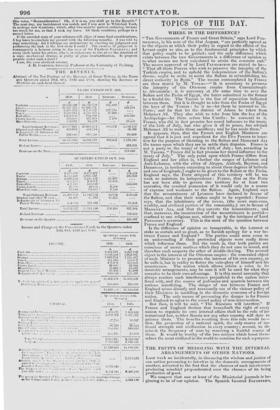TOPICS OF THE DAY.
WHERE IS THE DIFFERENCE?
' THE Governments of France and Great Britain," says Lord PAL- MERSTON, in his note of the 31st August, " are perfectly agreed as
to the objects at which their policy in regard to the affairs of the Levant ought to aim, as to the fundamental principles by which that policy ought to be guided; and the only difference which exists between the two Governments is a difference of opinion as
to what means are best calculated to attain the common end." The means approved of by Lord PALMERSTON are stated to be- " That all those Powers who wish to preserve the integrity of the Turkish empire, and to uphold the independence of the Sultan's throne, ought to unite to assist the Sultan in reestablishing his direct authority in Syria." The means contemplated by France are thus stated by M. Tninus-" It is necessary to preserve the integrity of the Ottoman empire from Constantinople to Alexandria : it is necessary at the same time to save the Sultan and the Pasha of Egypt, the latter submitted to the former by a feudal tic. The Taurus is the line of separation indicated between them. But it is thought to take from the Pasha of Egypt the keys of the Taurus : be it so-let them be restored to the Porte; and for that let the district of Adana be taken from Mehemet Ali. They also wish to take from him the key of the Archipelago-let them refuse him Candia : he consents to it. France, who did in Ilia promise her moral influence to the treaty of the 15th of July, but who gives it all to peace, has advised Mehemet Ali to make those sacrifices; and he has made them."
It appears, then, that the French and English Ministers are agreed that it is just and expedient for the Five Powers to inter- fere for the purpose of dictating to the Sultan and MEHEMET ALI the terms upon which they are to settle their disputes. France is not a party to the treaty of the 15th of July ; but, according to M. Tnwas, " France did in fact promise her moral influence to the treaty of July." The only point upon which France differs front England and her allies is, whether the ranges of Lebanon and Anti-Lebanon, with the cities of Aleppo, Antioch, Beyrout, and Damascus, (a territory extending to about three degrees of latitude and one of longitude,) ought to be given to the Sultan or the Paella. England says, the Porte stripped of this territory will be too weak to maintain its independence : France, that as the Porte has not been able to govern the territory for at least two centuries, the nominal possession of it would only be a source of expense and weakness to the Sultan. Again, England says that the mountaineers of Lebanon have declared in favour of the Sultan, and that their wishes ought to be regarded : France says, that the inhabitants of the towns, (the more numerous, wealthy, and civilized portion of the community) are in favour of MEHEMET ALI, and that they outvote the mountaineers ; anti that, moreover, the insurrection of the mountaineers is partial- confined to one religious sect, stirred up by the intrigues of Lord PONSONDY'S secretary. This is the state of the question between France and England.
Is the difference of opinion so insuperable, is the kiterest at stake so certain and so great, as to furnish apology for a war be- tween France and England ? The parties could soon come to an understading if their pretended objects were really those which influence them. But the truth is, that both parties are conscious of secret motives which they do not care to reveal, and therefore each suspects the other of double-dealing. The avowed object is the interest of the Ottoman empire: the concealed object of each Minister is to promote the interest of his own country, as
he calls it, but in reality to flatter the vain-glory of himself and his countrymen. The nation which allows others a voice in its domestic arrangements, may be sure it will be used for what they conceive to he their own advantage. It is this moral necessity that always renders such interference prejudicial to the nation inter- fered with, and the source of jealousies and quarrels between the nations interfering. The danger of war between France and England arises directly and necessarily out of' the vicious policy of
their Ministers in meddling in tin' domestic concerns of a foreign nation. The only MUMS of preventing the danger is for France and England to agree to the sound policy of' non-intervention.
But then, it 'will be said, " The Russians will interfere." If France and England declare that henceforth the right of every nation to regulate its own internal atlhirs shall be the rule of in- ternational law, neither Russia nor any other country will dare to gainsay them. The benefits resulting from this rule would be- first, the promotion of' a national spirit, the only source of na- tional strength and civilization in every country ; second, to di- minish the frequency of' wars by removing a fruitful source of them. It would be worthy of' the two nations which boast them- selves the must civilized in the world to combine for such a purpose.


























 Previous page
Previous page